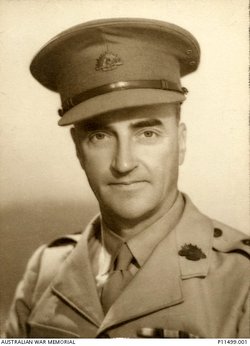Northern Times, Carnarvon, W.A. – Saturday, 1 November 1941.
“WINDS OF DEATH.
Rottnest Island Tragedy.
Until the body of Lieutenant Colonel Hermann August Kuring, commanding officer of the 10th Garrison Battalion at Rottnest Island, is recovered, there can be no inquest.
Probably the military will hold an inquiry, and in due course death can be legally presumed by the relatives.
The mystery of the Colonel's disappearance is not so strange to those who know the popular island, and understand the strength of the winds that have been blowing along the coast in that region during recent weeks.
Several minor accidents have occurred along the Fremantle coastline during September. Only last week a man working on a ladder at a southern resort was caught by a sudden gust of wind, and had he not providentially grabbed the building spouting as he was lifted from his feet, he would have sustained more than bruises in the subsequent fall.
WINDS OF DEATH.
It was a squally day when Colonel Kuring made his inspection of certain works in the vicinity whence he disappeared.
He was probably walking in a moderate gale one minute, and within a second or two was caught by one of those sudden and overwhelming bursts for which the September winds on the island have become famous, or infamous and, if at that moment, his balance was insecure and he had nothing to lay quick hold of, it would have been simple for him to have toppled from his foothold. The jagged cliffs and the lashing waters would do the rest. The tendency of the currents would have been to eddy his body away to sea, in which event it is possible that his remains will never be recovered. His unconscious, physical end, in those circumstances, would have been painless.”
Bio provided by R & S Contributor #46634910
Northern Times, Carnarvon, W.A. – Saturday, 1 November 1941.
“WINDS OF DEATH.
Rottnest Island Tragedy.
Until the body of Lieutenant Colonel Hermann August Kuring, commanding officer of the 10th Garrison Battalion at Rottnest Island, is recovered, there can be no inquest.
Probably the military will hold an inquiry, and in due course death can be legally presumed by the relatives.
The mystery of the Colonel's disappearance is not so strange to those who know the popular island, and understand the strength of the winds that have been blowing along the coast in that region during recent weeks.
Several minor accidents have occurred along the Fremantle coastline during September. Only last week a man working on a ladder at a southern resort was caught by a sudden gust of wind, and had he not providentially grabbed the building spouting as he was lifted from his feet, he would have sustained more than bruises in the subsequent fall.
WINDS OF DEATH.
It was a squally day when Colonel Kuring made his inspection of certain works in the vicinity whence he disappeared.
He was probably walking in a moderate gale one minute, and within a second or two was caught by one of those sudden and overwhelming bursts for which the September winds on the island have become famous, or infamous and, if at that moment, his balance was insecure and he had nothing to lay quick hold of, it would have been simple for him to have toppled from his foothold. The jagged cliffs and the lashing waters would do the rest. The tendency of the currents would have been to eddy his body away to sea, in which event it is possible that his remains will never be recovered. His unconscious, physical end, in those circumstances, would have been painless.”
Bio provided by R & S Contributor #46634910
Sponsored by Ancestry
Advertisement
Records on Ancestry
Advertisement



